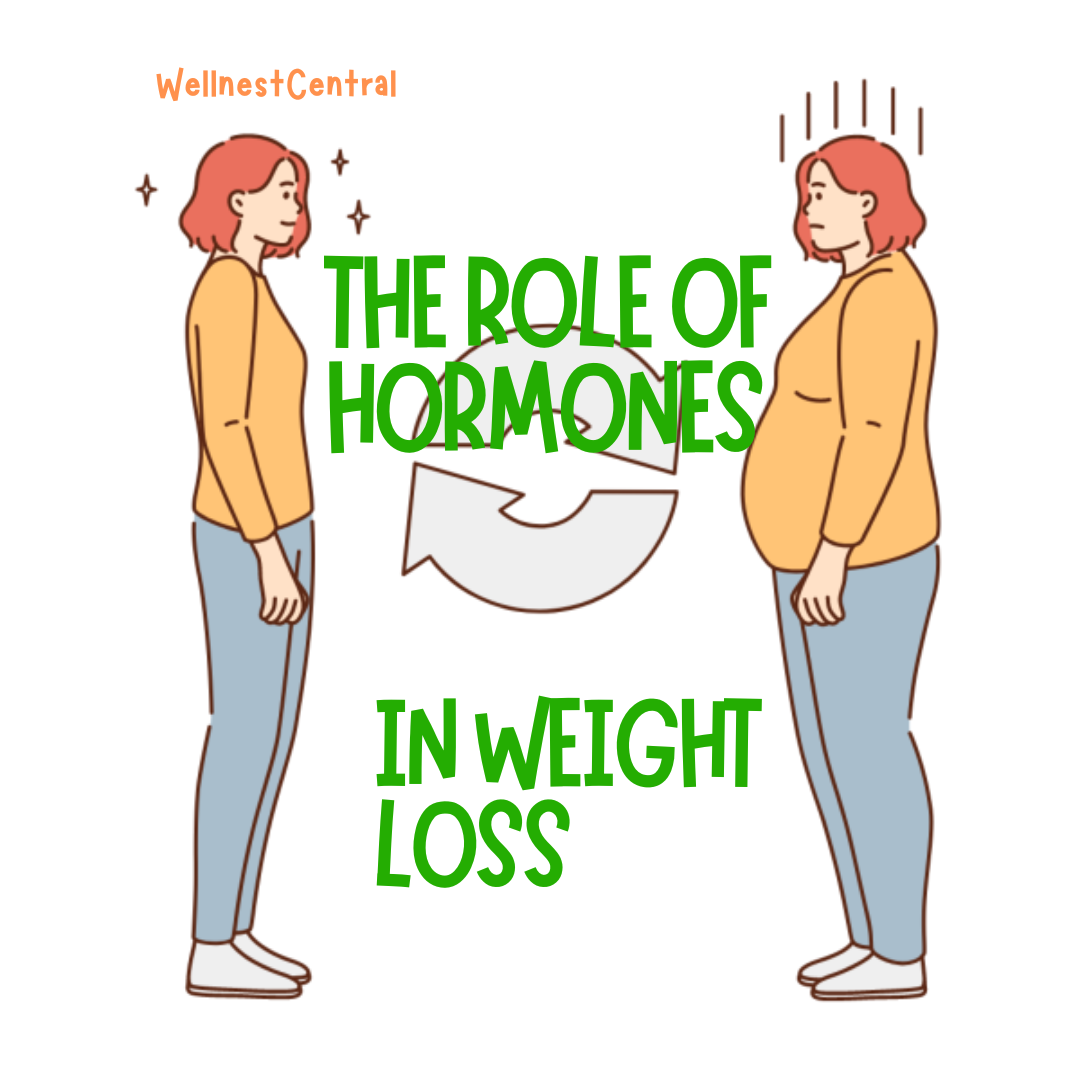Introduction
The Role of Hormones in Weight Loss: Understanding and Balancing Them for Better Results is more crucial than you may realise. Ever wonder why some people seem to lose weight effortlessly while others struggle despite their best efforts? The answer might not lie solely in willpower or dieting but in something deeper—hormones. Hormones regulate your body’s metabolism, hunger, fat storage, and energy expenditure. When they’re out of balance, they can make it difficult to lose weight and keep it off.
In this article, we’ll explore how hormones like insulin, cortisol, leptin, ghrelin, thyroid hormones, and estrogen impact weight loss and discover natural ways to balance these hormones for better results.
Find out the best exercise for weight loss: Cardio vs. Strength Training: Finding the Right Balance for Effective Weight Loss
Understanding the Hormonal Players in Weight Loss
Your body is an intricate system, and hormones are its messengers. When working well, they regulate processes like metabolism, hunger, and fat burning. However, imbalances can throw everything off, making weight loss more challenging. Let’s delve into the key hormones affecting your ability to lose weight.
1. Insulin: The Fat Storage Hormone
What Is Insulin’s Role?
Insulin is produced by the pancreas and is responsible for regulating blood sugar levels. When you eat carbohydrates, your blood sugar rises, and insulin is released to help store glucose in cells for energy or convert excess glucose into fat.
How Imbalances Affect Weight Loss:
When insulin levels are consistently high (as in the case of insulin resistance), your body can store more fat and find it difficult to break down stored fat for energy. This can make losing weight much harder.
Balancing Insulin Naturally:
- Eat Low-Glycemic Foods: Opt for foods that don’t spike blood sugar levels, like whole grains, leafy greens, berries, and lean protein.
- Avoid Refined Sugars and Processed Carbs: These lead to insulin spikes and fat storage.
- Exercise Regularly: Both aerobic and strength-training exercises improve insulin sensitivity.
2. Cortisol: The Stress Hormone
What Is Cortisol’s Role?
Cortisol is produced by the adrenal glands in response to stress. In short bursts, cortisol helps your body respond to immediate threats, but chronic stress causes a constant elevation of cortisol levels.
How Imbalances Affect Weight Loss:
High cortisol levels can lead to increased hunger, sugar cravings, and fat accumulation, especially around the abdomen. This “stress fat” is notoriously difficult to lose and can perpetuate a cycle of stress and weight gain.
Balancing Cortisol Naturally:
- Incorporate Stress-Reducing Practices: Try mindfulness techniques like meditation, yoga, or deep breathing.
- Prioritize Quality Sleep: Aim for 7-9 hours a night; poor sleep increases cortisol and hunger hormones.
- Eat Regular, Balanced Meals: Skipping meals can lead to blood sugar dips and cortisol spikes. Make sure meals contain protein, healthy fats, and fiber.
3. Leptin: The Satiety Hormone
What Is Leptin’s Role?
Leptin is produced by fat cells and signals to your brain when you’re full and have enough energy stored. The more fat you have, the more leptin is produced.
How Imbalances Affect Weight Loss:
Leptin resistance can occur when your brain stops responding to leptin signals, despite having high levels in your body. This means you might feel hungry even when you’re full, leading to overeating and weight gain.
Balancing Leptin Naturally:
- Get Enough Sleep: Lack of sleep reduces leptin levels and increases hunger.
- Avoid High-Sugar Diets: Diets high in sugar and processed foods can lead to leptin resistance.
- Include Anti-Inflammatory Foods: Omega-3-rich foods like salmon, walnuts, and flaxseeds can improve leptin sensitivity.
4. Ghrelin: The Hunger Hormone
What Is Ghrelin’s Role?
Ghrelin is the hormone that signals hunger to your brain. It increases before meals to stimulate appetite and decreases after eating.
How Imbalances Affect Weight Loss:
In those struggling with obesity or following restrictive diets, ghrelin levels can remain high, constantly signaling hunger and making it harder to stick to a calorie deficit.
Balancing Ghrelin Naturally:
- Eat Protein-Rich Meals: Protein is more satiating than fats or carbs, helping reduce ghrelin levels and hunger.
- Avoid Fad Diets: Extreme caloric restrictions increase ghrelin levels, making you feel hungrier.
- Stay Hydrated: Drinking water before meals can help control ghrelin levels and reduce calorie intake.
5. Thyroid Hormones: The Metabolic Regulators
What Are Thyroid Hormones’ Roles?
The thyroid gland produces hormones like T3 and T4 that regulate metabolism and energy production. Proper thyroid function ensures that your body uses energy efficiently.
How Imbalances Affect Weight Loss:
Hypothyroidism (underactive thyroid) can slow down metabolism, causing weight gain or difficulty losing weight. Common symptoms include fatigue, cold intolerance, and unexplained weight gain.
Balancing Thyroid Hormones Naturally:
- Ensure Nutrient Sufficiency: Iodine, selenium, and zinc are essential for thyroid health. Include foods like seaweed, Brazil nuts, eggs, and fish in your diet.
- Avoid Excessive Soy and Gluten: In some individuals, soy and gluten may interfere with thyroid hormone production.
- Limit Exposure to Environmental Toxins: Chemicals found in plastics, processed foods, and non-organic produce can disrupt thyroid function.
6. Estrogen: The Hormone That Influences Fat Distribution
What Is Estrogen’s Role?
Estrogen, a primary female hormone, also plays a role in fat storage and distribution. Too much estrogen (estrogen dominance) can promote fat storage, particularly around the hips and thighs.
How Imbalances Affect Weight Loss:
Estrogen dominance can cause weight gain, bloating, and difficulty losing fat. This imbalance often occurs due to excessive exposure to xenoestrogens (found in plastics and certain cosmetics) and hormonal imbalances like Polycystic Ovary Syndrome (PCOS).
Balancing Estrogen Naturally:
- Consume Fiber-Rich Foods: Fiber helps remove excess estrogen from the body. Whole grains, vegetables, and legumes are excellent sources.
- Avoid Hormone-Disrupting Chemicals: Limit plastic use, avoid non-organic meat, and opt for natural skincare products.
- Exercise Regularly: Physical activity can help maintain balanced estrogen levels and improve metabolism.
Putting It All Together: A Holistic Approach to Hormonal Balance for Weight Loss
Balancing hormones isn’t about focusing on one hormone at a time but rather taking a holistic approach to support your overall hormonal health. Here are some daily practices to maintain balanced hormones for weight loss:
1. Prioritize a Balanced Diet
- Eat whole, minimally processed foods.
- Aim for meals containing protein, healthy fats, and complex carbohydrates.
- Include fiber-rich foods to support digestion and hormonal balance.
2. Stay Physically Active
- Engage in both strength training and cardio to support fat loss, muscle gain, and overall hormone balance.
- Activities like yoga and Pilates can reduce stress hormones and improve well-being.
3. Get Quality Sleep and Manage Stress
- Aim for consistent sleep schedules and a restful sleep environment.
- Reduce stress through mindfulness practices, nature walks, social support, and leisure activities.
4. Stay Hydrated and Limit Alcohol
- Drink plenty of water throughout the day.
- Minimize alcohol consumption, as it can disrupt hormone production and lead to weight gain.
5. Include Healthy Fats in Your Diet
- Foods like avocados, nuts, seeds, and olive oil support hormone production and keep you satiated.
- Omega-3 fatty acids found in fatty fish like salmon and sardines help reduce inflammation and support hormonal health.
Conclusion: Balance Your Hormones, Balance Your Weight
The key to successful weight loss lies in understanding and balancing your hormones. By addressing hormonal imbalances naturally through diet, exercise, stress management, and sleep, you can create a supportive environment for your body to release excess weight.
Remember, the journey to weight loss and hormonal health is a marathon, not a sprint. Take small steps, make sustainable lifestyle changes, and listen to your body as it responds to these adjustments.
Call to Action
Did you find these tips helpful? Share how you plan to incorporate hormonal balance into your weight loss journey in the comments below! And don’t forget to subscribe to our blog for more practical health and wellness advice.
FAQs
1. How do hormones affect weight loss?
Hormones regulate hunger, metabolism, and fat storage. Imbalances in hormones like insulin, cortisol, and leptin can make it challenging to lose weight or maintain weight loss.
2. Can hormonal imbalances be fixed with diet alone?
Diet plays a significant role in hormonal balance, but lifestyle factors like exercise, sleep, and stress management are also important for optimal hormone health.
3. Is stress the main cause of weight gain?
Chronic stress raises cortisol levels, which can lead to increased hunger and fat storage, particularly around the abdomen. Managing stress is crucial for weight loss.
4. Why am I still hungry after eating?
High levels of ghrelin (the hunger hormone) or low levels of leptin (the fullness hormone) can cause persistent hunger. Ensuring balanced meals and adequate sleep can help regulate these hormones.





Pingback: 7 Surprising Reasons You’re Not Losing Weight on Semaglutide – And How to Fix It Fast! - Wellnest Central